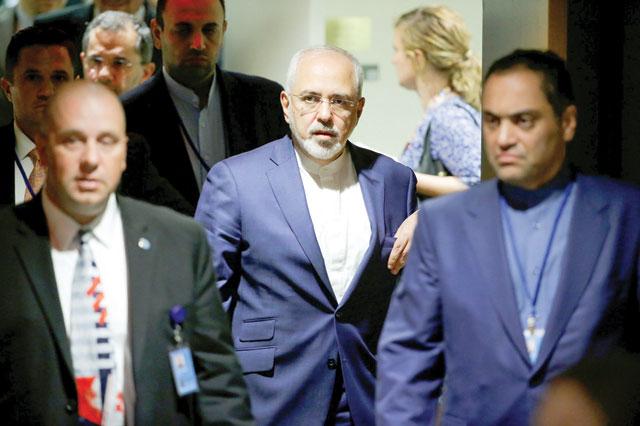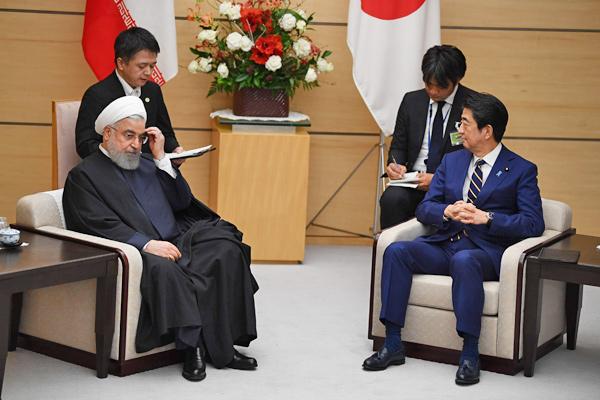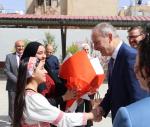You are here
Zarif: Iran nuclear deal architect in crosshairs of US sanctions
By AFP - Aug 01,2019 - Last updated at Aug 01,2019

In this file photo taken on July 17 Iranian Foreign Minister Javad Zarif arrives at a high level political forum on sustainable development at UN Headquarters in New York (AFP photo)
TEHRAN — Mohammad Javad Zarif, who has been targeted in new US sanctions against Iran, is a veteran diplomat known abroad for being charming and articulate but with his critics at home.
Zarif is credited with crafting Iran's landmark nuclear deal, and when thousands of Iranians flocked to the streets to celebrate the historic agreement, it was his name they chanted.
Even though Zarif has spent years dodging "daggers" from detractors at home, Washington's decision to target him has apparently rallied officials around the foreign minister.
As the Islamic republic's top diplomat, Zarif led the negotiations between September 2013 and July 2015 that led to the deal, heralded as ending Iran's international isolation and lifting US sanctions.
But initial elation came crashing down last year when US President Donald Trump pulled out of the agreement and reimposed crippling sanctions, hitting Iranians hard.
Having targeted nearly every vital sector of the economy, the Trump administration upped the ante by first sanctioning Iran's supreme leader Ayatollah Ali Khamenei, and then Zarif who "implements his reckless agenda".
The social media-savvy diplomat quickly responded by Tweeting that he has "no property or interests outside of Iran" and thanked Washington for considering him "such a huge threat".
Zarif has for years come under fire from conservatives at home, who resented his close relationship with his then US counterpart, John Kerry, during the nuclear talks.
"We were more worried by the daggers that were struck from behind than the negotiations," he once told the Jomhoori Eslami newspaper. "Internal pressure wore me down both during and after the talks."
'Mr Ambassador'
Spending more than a third of his life in the United States and speaking flawless English have made him a hate figure for hardliners in his own country, who tried to impeach him last year.
Zarif resigned in February and regained political capital in face of criticism when his resignation was rejected by President Hassan Rouhani.
He hinted at quitting again last month when a state television series portrayed him as passive and inept in the face of foreign pressure, telling Khamenei it is not "permissable" to continue.
Khamenei, however, reassured him by saying, "I am not at all content that you would be insulted in the least," according to ISNA news agency.
Raised in a religious family in Tehran, the two-time ambassador to the United Nations revealed in a best-selling memoir, "Mr Ambassador", that he did not listen to music until he was 15.
His involvement with politics goes back to his teenage years, when he attended secret meetings in the run-up to the revolution.
When he was 16, his parents sent Zarif to California after the shah's regime threatened to arrest him.
There, he joined the Islamic Student Association and made many friends who later became political figures in Iran.
Among them was the brother of Akbar Hashemi Rafsanjani, president from 1989 until 1997.
He held on to his devout ways. When he lived in the United States in the 1980s, his wife, then a staunch revolutionary, did not allow him to buy a television for nearly 10 years, he said.
She later became a follower of Mohammad Esmail Dulabi, a mystic whose teachings changed her into "a quiet person filled with patience and tolerance".
"The new version had the greatest influence on our family," Zarif said. They have two adult children.
Internal strife
Following the seizure of the US embassy in Tehran by Islamist students in 1979 and the subsequent cutting of ties with Washington, Zarif was sent to shut down Iran's consulate in San Francisco.
He then studied international relations and earned a PhD from the University of Denver, writing a dissertation on "sanctions in international law".
Zarif has decades of experience as a negotiator.
He was a member of Iranian delegations which hammered out a ceasefire ending eight years of war with Iraq in 1988 and secured the release of American hostages in Lebanon in 1991.
In the late 1980s, he joined the Iranian delegation at the United Nations and was ambassador from 2002 to 2007, during the presidency of reformist president Mohammad Khatami.
He was sacked by hardline president Mahmoud Ahmadinejad.
But when the more moderate Hassan Rouhani became president in 2013, Zarif was rehabilitated and picked to head the foreign ministry.
Despite his fervent efforts to save the nuclear deal, Zarif has hinted internal strife had made his position untenable.
In an interview published when he tried to resign in February, he told Jomhoori Eslami: "Everything will be lost when there is no trust in the manager of foreign policy."
But the US decision to hit him with sanctions appears to have won him wider support.
Iran's powerful Revolutionary Guards in a statement called the sanctions against Zarif "absurd" and thanked him for fighting a "media war" and advancing the Islamic republic's diplomacy of resistance.
Related Articles
TEHRAN — Mohammad Javad Zarif is credited with crafting Iran's landmark nuclear deal, but the veteran diplomat has spent years dodging "dagg
TEHRAN — Iran’s Foreign Minister Mohammad Javad Zarif is expected to visit Paris and meet with his counterpart and the French president on F
TOKYO — Iranian President Hassan Rouhani wrapped up his two-day visit to Japan on Saturday as Tehran, under US sanctions pressure, sought ec

















